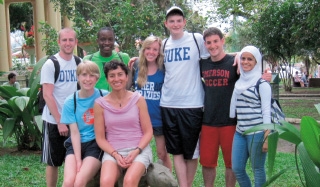Students wanted Bethzaida Fernandez, a lecturer in the Spanish language program, to take them home—not to her place in Durham but to her native Costa Rica. For the past two years, with a small grant from the Romance studies department, Fernandez has done just that. She’s offered fifteen students the chance to spend an alternative spring break in the Central American nation, in the town of Turrialba, caring for children and living with Costa Rican families.
“I’ve always believed in learning with a community,” says Fernandez. “The kids are out of their comfort zones, and that allows for the greatest opportunity for growing and learning they might have.”
During the first outing, students worked at a children’s temporary home; last March, helping at a school was added. The students, who must be at an intermediate level or higher in Spanish fluency, have done everything from painting facilities to playing school games. One student said of the experience, “A lot of my friends went on a cruise; however, I think there is so much more value to actually staying in a country for an extended period and really learning about the people and culture.” Fernandez believes the students’ experiences are reciprocal. “The trip allows for dual learning; they learn, and the community learns.”
Education, as well as biological research and conservation, is the focus of the Organization for Tropical Studies (OTS), which also hosts a program in Costa Rica. This year, the organization’s fiftieth anniversary celebration is offering Duke students and faculty members an opportunity to help the organization shape its ecological agenda.
The celebration officially kicked off with events over the summer in Costa Rica, including a photo exhibition at the country’s national museum. In late June, Duke provost Peter Lange toured one of the three research field stations and the rainforest, meeting with Duke students and researchers, and participated in a panel about how universities can support tropical studies. An OTS stint serves the students “wonderfully well,” he says. “There’s also a strong interdisciplinary environment, so it’s an extremely rewarding educational experience.” Indeed, Elizabeth Losos, president and CEO of OTS, says as part of the celebration, Duke students will contribute ideas to help the group reach its goal to cut electricity use by 50 percent at its research stations.
Duke in Costa Rica: At a Glance
Current students who were born in Costa Rica: 5
Costa Rican nationals working at Duke: 1
Alumni living in Costa Rica: 34
Number of undergraduate students who traveled to Costa Rica with university programs in 2012-13: 15
Key Duke connections:
• The Nicholas School of the Environment offers a course that focuses on respiratory proteins and the environment in Costa Rica and conducts research related to the country’s protected area and biodiversity conservation as part of the master of environmental management degree.
• Through the Duke Global Health Institute, Duke’s branch of Engineering World Health places engineering students in developing-world hospitals to refurbish medical equipment each summer.

Share your comments
Have an account?
Sign in to commentNo Account?
Email the editor